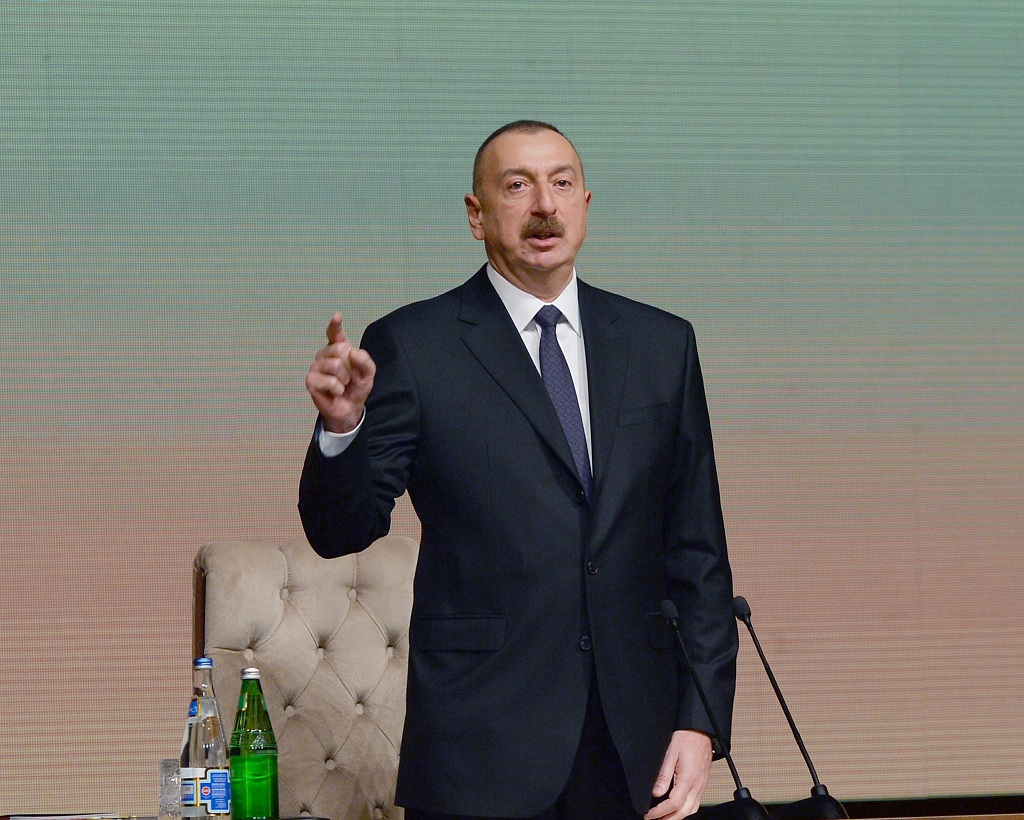At a conference reviewing the socioeconomic development of the regions of Azerbaijan during the fourth year of the 2014 – 2018 State Program, President Ilham Aliyev reported that this year 20,000 internally displaced persons (IDPs) as a result of the Nagorno-Karabakh conflict with Armenia will be provided with new homes.
“This year, 20,000 IDPs will be provided with new homes. Last year, we housed 12,000 IDPs,” Aliyev said.
“This year, new houses will be given to 4,000 families - at least 20,000 displaced persons. Thus, the number of IDPs to be provided with homes, apartments, and well-being will be around 290,000.”
Armenia and Azerbaijan have been at odds for more than a quarter of a century over Nagorno-Karabakh, a region that belongs to Azerbaijan but was partially populated by ethnic Armenians alongside indigenous Azerbaijanis. Due to an ethnic Armenian population there Armenia started claiming the region during the breakup of the USSR in the late 1980s and early 1990s.
The two countries went to war virtually after the Soviet Union’s dissolution in 1991, which lasted until a ceasefire went into effect by May 1994. The results of the war included more than 20,000 Azerbaijanis killed and one million displaced. Azerbaijan’s Nagorno-Karabakh region and seven surrounding districts – Lachin, Kalbajar, Aghdam, Fuzuli, Jabrayil, Qubadli, and Zangilan, all which amount to about 20 percent of the country's lands – were occupied by Armenia.
“The people of Azerbaijan will never reconcile with the occupation, and Azerbaijanis are ready to go to their native lands,” Aliyev declared at Monday’s conference where he underlined the success of the Azerbaijani economy – the most successful in the South Caucasus, with a gross domestic product of nearly $41.5 billion in 2017.
Despite the ceasefire, the conflict regularly spirals out of control and tests regional stability.
In April 2016, the two sides went to war for four days in a fight that has been called the April War or Four Day War. Azerbaijani forces managed to regain control over two strategic hills and a village, called Jojug Marjanli, totaling about 2,000 hectares (approximately 5,000 acres) of land it had lost in the 1990s, near the Line of Contact.
After Jojug Marjanli village in the Jabrayil district were regained, the government allocated $2.5 million to build or restore nearly 200 houses, a school, and all necessary infrastructure in the area to allow displaced families, or nearly 1,500 people, to return.
“We restored Jojug Marjanli village last year. This is a historic event,” President Aliyev said on Monday in Baku.
“A small town for 150 families was built in Jojug Marjanli. This is of special significance. Because this project has been implemented in the land once occupied [by Armenia] and then liberated by our army.”
“Implementation of the project at the same time shows that Azerbaijan will restore its territorial integrity and new towns, settlements, villages, schools, residential buildings, all infrastructure will be built in these destroyed [by Armenia] lands.”
Armenia has been claiming that Nagorno-Karabakh region was once part of an early Christian kingdom which Yerevan tries to present as a ground for sovereignty of ethnic Armenians. However the international community irreversibly ignores sovereignty aspiration of those Armenians living in the Nagorno-Karabakh region, which is a part of internationally recognized territory of Azerbaijan.
Azerbaijani historians have been providing fact-based evidences that churches in Nagorno-Karabakh are the heritage of Caucasian Albanians, a Turkic nation that converted to Christianity and are regarded as among the ancestors of Azerbaijanis. Caucasian Albania, which is unrelated to the state of Albania in Eastern Europe, existed from the 4th century B.C. to 8th century A.D. in what is now Azerbaijan, a portion of Georgia, and Southern Dagestan in Russia.
Today, Baku rejects the status quo in Nagorno-Karabakh region and demands Yerevan pulls its forces from all Azerbaijani territories. The government has repeated its willingness to give greater autonomy to Nagorno-Karabakh region should the conflict end and Armenia relinquishes any claims for the region.







 Russian Foreign Minister Sergei Lavrov has reasserted that Moscow has no intentions to stop the fighting in Ukraine, even if peace talks commence.
Russian Foreign Minister Sergei Lavrov has reasserted that Moscow has no intentions to stop the fighting in Ukraine, even if peace talks commence.
 Iran has refuted reports of alleged damage to Shimon Peres Negev Nuclear Research Centre located southeast of Dimona, Israel, during the recent air...
Iran has refuted reports of alleged damage to Shimon Peres Negev Nuclear Research Centre located southeast of Dimona, Israel, during the recent air...
 Iran’s Foreign Minister, Hossein Amir-Abdollahian, has labeled a foiled Israeli drone attack in certain parts of the country as a "failure" for Isr...
Iran’s Foreign Minister, Hossein Amir-Abdollahian, has labeled a foiled Israeli drone attack in certain parts of the country as a "failure" for Isr...



